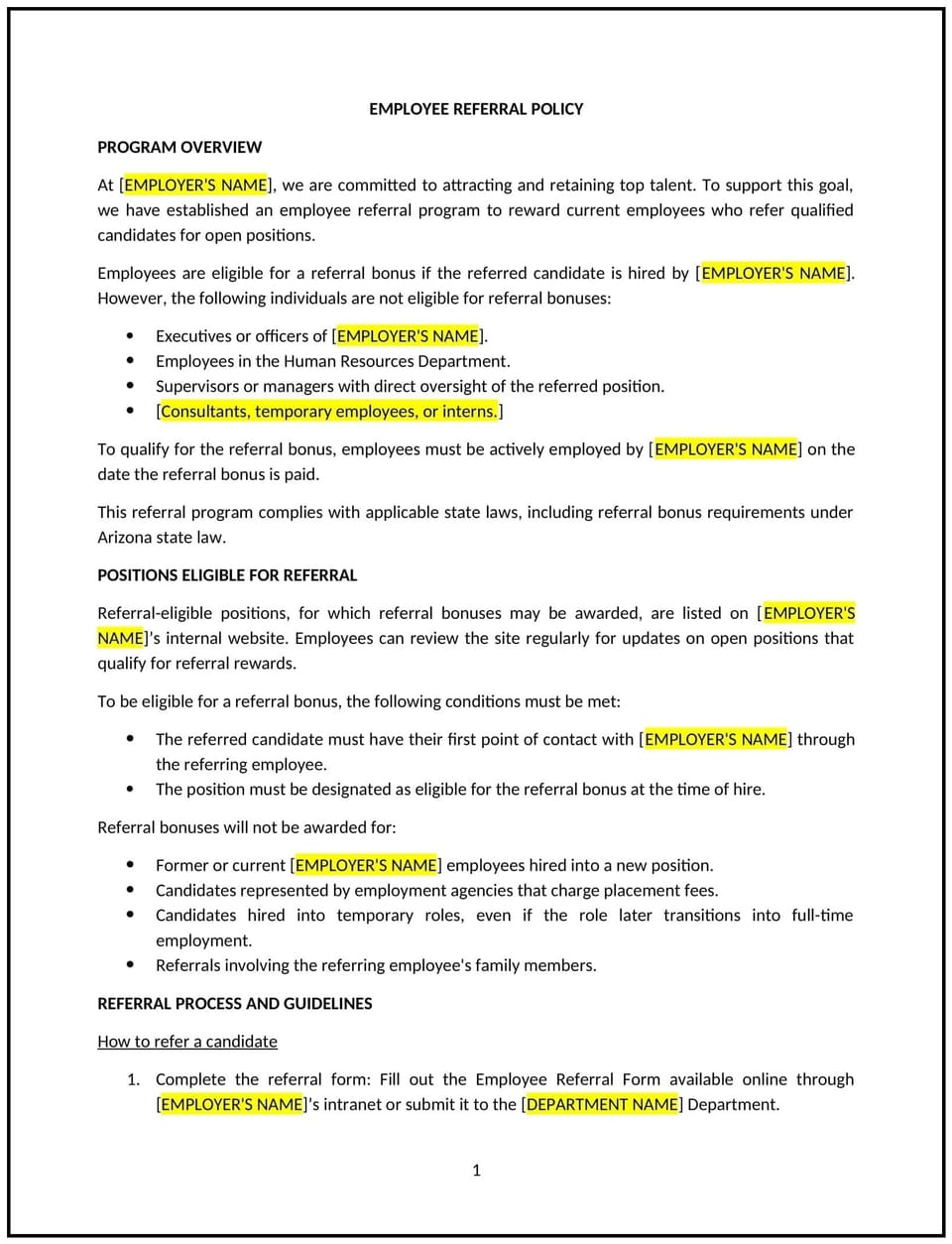Employee referral policy (Arizona): Free template

Employee referral policy (Arizona)
In Arizona, an employee referral policy provides businesses with a structured process for encouraging employees to refer qualified candidates for open positions. This policy fosters a collaborative recruitment strategy, improves hiring outcomes, and rewards employees for contributing to the company’s growth.
This policy outlines eligibility criteria, referral procedures, and rewards for successful referrals. By implementing this policy, Arizona businesses can enhance their talent acquisition efforts while building a strong, engaged workforce.
How to use this employee referral policy (Arizona)
- Define eligible roles: Specify which positions are open for referrals and any exclusions, such as executive roles or temporary positions.
- Outline referral procedures: Provide instructions on how employees can submit referrals, including required details such as the candidate’s resume and contact information.
- Set reward criteria: Clearly state the conditions for receiving referral rewards, such as successful completion of a probationary period by the referred candidate.
- Communicate timelines: Indicate when employees can expect to receive rewards after a successful referral.
- Address tax implications: Inform employees that referral rewards may be subject to taxes and will be reported accordingly.
Benefits of using an employee referral policy (Arizona)
This policy offers several advantages for Arizona businesses:
- Improves recruitment: Leverages employees’ networks to identify high-quality candidates, reducing time-to-hire.
- Enhances engagement: Encourages employees to actively participate in the company’s growth by contributing to the hiring process.
- Supports cost-efficiency: Reduces reliance on expensive recruitment channels by using internal networks.
- Builds team cohesion: Facilitates hiring candidates who align with the company’s culture, improving workplace harmony.
- Provides clarity: Establishes transparent guidelines for referrals, ensuring fairness and consistency.
Tips for using an employee referral policy (Arizona)
- Address Arizona-specific considerations: Tailor rewards or criteria to reflect local workforce trends or industry practices.
- Promote the program: Regularly remind employees about the referral program through internal communications and team meetings.
- Set realistic expectations: Clearly communicate the referral process, reward timelines, and any exclusions to avoid misunderstandings.
- Track referrals: Use tracking tools to monitor referral outcomes and measure the program’s effectiveness.
- Update as needed: Revise the policy periodically to reflect changes in hiring needs or organizational goals.
Q: What types of rewards are offered for successful referrals?
A: Rewards may include cash bonuses, gift cards, extra vacation days, or other incentives, as specified in the policy.
Q: Are there any restrictions on who can be referred?
A: Yes, restrictions may apply to roles like executives, temporary positions, or candidates who have previously applied to the company within a certain timeframe.
Q: When will employees receive their referral rewards?
A: Rewards are typically issued after the referred candidate successfully completes a probationary period or a specified duration of employment.
Q: Can employees refer family members or friends?
A: Yes, employees can refer family members or friends, provided they meet the job qualifications and comply with the referral policy.
Q: How does this policy help improve hiring outcomes?
A: By leveraging employees’ networks, the policy increases the likelihood of finding candidates who align with the company’s culture and values, improving retention and performance.
This article contains general legal information and does not contain legal advice. Cobrief is not a law firm or a substitute for an attorney or law firm. The law is complex and changes often. For legal advice, please ask a lawyer.


